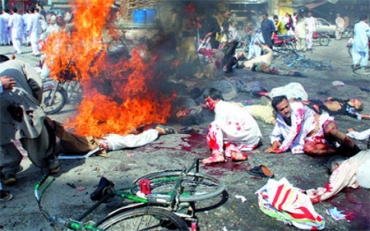Teenage suicide bomber kills 20 in Pakistan

Among the dead were the local chief and deputy of a tribal police force recruited by the government to help defeat the Taliban in the northwest. Such forces are frequently targeted by militants linked to the Taliban and Al Qaida.
The bomber, who intelligence officials said was aged 14 to 16, detonated explosives strapped to his chest in Khar, the main town of Bajaur district. Bajaur has been one of the toughest battlegrounds in Pakistan's fight against a northwestern Taliban insurgency.
It was the deadliest bombing in Pakistan since March 2, when at least 22 people were killed by a suicide attack on a mosque in the tribal district of Khyber.
"Twenty people, including five policemen, were killed and 46 others were wounded. Some shops and a restaurant were destroyed," Islam Zeb, the top official and administrative head of Bajaur tribal district, told AFP.
Officials had earlier put the death toll at 16.
It was the third bomb attack in two days in Bajaur, after twin blasts killed five people - including pro-government elders and security personnel - on Thursday.
The violence highlights the insurgency in Pakistan at a time when Islamabad is under renewed US pressure crack down on militants based on its soil, such as the Haqqani network, blamed for a spectacular assault on Kabul last month.
Rescue workers pulled out at least four bodies from the collapsed debris of shops and a restaurant that caved in under the Bajaur blast, said administration official Mustafa Kamal.
The military conducted major anti-Taliban offensives in Bajaur in August 2008 and February 2009, and has repeatedly declared the district secure.
But militants have still proved able to strike.
"Apparently, the bomber was waiting for the (local) head of police, and he rushed and jumped towards him when he was talking to other policemen at a checkpost," he said.
According to an AFP tally, around 5,000 people have been killed in militant attacks across the country since July 2007, when government troops raided an extremist mosque in the capital Islamabad, sparking a bloody insurgency.
Doctor Habib Khan, head of the main hospital in Khar, warned that the toll could rise further after Friday's attack because some of the wounded were in a critical condition.
There was no immediate claim of responsibility. The attack came two days after Pakistan went on a high state of alert for the first anniversary of Osama Bin Laden's killing by American troops, fearing a wave of revenge attacks.
Tribal police, who are recruited to help the government fight Taliban militants in the tribal belt, are frequently attacked.
Pakistan has lost more than 3,000 soldiers in the fight against homegrown insurgents but has resisted US pressure to do more to eliminate havens used by those fighting the Americans in Afghanistan.
The US conducts a secretive drone war against Taliban and Al Qaida militants based on Pakistani soil, despite increasingly vocal public denunciations from the government that initially gave its tacit approval to the strikes.
Relations between Pakistan and the United States have lapsed into stalemate since the covert American raid that killed Bin Laden last May and US air strikes that inadvertently killed 24 Pakistani soldiers in November.
Pakistan has shut down Nato supply lines into Afghanistan and last month parliament approved new guidelines on relations with the United States, which included a call for an end to drone strikes.
It remains unclear whether the impasse with Washington can be solved before this month's Nato summit on Afghanistan in Chicago, to which Islamabad has been invited.












